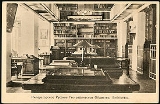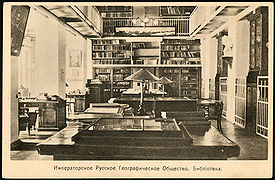
Russian Geographical Society
Encyclopedia

Learned society
A learned society is an organization that exists to promote an academic discipline/profession, as well a group of disciplines. Membership may be open to all, may require possession of some qualification, or may be an honor conferred by election, as is the case with the oldest learned societies,...
, founded on 6 August 1845 in Saint Petersburg
Saint Petersburg
Saint Petersburg is a city and a federal subject of Russia located on the Neva River at the head of the Gulf of Finland on the Baltic Sea...
, Russia
Russia
Russia or , officially known as both Russia and the Russian Federation , is a country in northern Eurasia. It is a federal semi-presidential republic, comprising 83 federal subjects...
.
Imperial Geographical Society
Prior to the Russian Revolution of 1917Russian Revolution of 1917
The Russian Revolution is the collective term for a series of revolutions in Russia in 1917, which destroyed the Tsarist autocracy and led to the creation of the Soviet Union. The Tsar was deposed and replaced by a provisional government in the first revolution of February 1917...
, it was known as the Imperial Russian Geographical Society.
Founding members of the Society
these included:- Fyodor Litke
- Fyodor Wrangel
- Vladimir Dahl
- Vladimir Odoyevsky
- Friedrich Georg Wilhelm von StruveFriedrich Georg Wilhelm von StruveFriedrich Georg Wilhelm von Struve was a Danish-Baltic German astronomer from a famous dynasty.-Life:...
- Karl Ernst von BaerKarl Ernst von BaerKarl Ernst Ritter von Baer, Edler von Huthorn also known in Russia as Karl Maksimovich Baer was an Estonian naturalist, biologist, geologist, meteorologist, geographer, a founding father of embryology, explorer of European Russia and Scandinavia, a member of the Russian Academy of Sciences, a...
- Nikolai NadezhdinNikolai NadezhdinNikolai Ivanovich Nadezhdin was a Russian literary critic and Russia's first ethnographer.Born in the Zaraisk District of Ryazan guberniya, Nadezhdin graduated from Ryazan Seminary in 1815 and Moscow Religious Academy in 1824...
The Society's official presidents were Grand Duke Konstantin Nikolayevich of Russia
Grand Duke Konstantin Nikolayevich of Russia
Grand Duke Konstantin Nikolayevich of Russia was the second son of Tsar Nicholas I of Russia.During the reign of his brother Alexander II, Konstantin was an admiral of the Russian fleet and reformed the Russian Navy. He was also an instrumental figure in the emancipation of the serfs...
in 1845-92 and Grand Duke Nicholas Mikhailovich of Russia
Grand Duke Nicholas Mikhailovich of Russia
Grand Duke Nicholas Mikhailovich of Russia , 26 April 1859 – 28 January 1919 was the eldest son of Grand Duke Michael Nicolaievich of Russia and a first cousin of Alexander III....
in 1892-1917, but actually it was run by the Vice-Presidents: Fyodor Litke (1845–50, 1855–57), Count Mikhail Muravyov
Mikhail Nikolayevich Muravyov-Vilensky
Count Mikhail Nikolayevich Muravyov was one of the most reactionary Russian imperial statesmen of the 19th century...
(1850–57), Pyotr Semyonov-Tyan-Shansky (1873–1914), and Yuly Shokalsky
Yuly Shokalsky
Yuly Mikhailovich Shokalsky was a Russian oceanographer, cartographer, and geographer.A grandson of Anna Kern, Pushkin's celebrated mistress, Shokalsky graduated from the Naval Academy in 1880 and made a career in the Imperial Russian Navy, helping establish the Sevastopol Marine Observatory and...
(1914–31).
The filial societies were established at the Caucasus (1850), Irkutsk (1851), Vilnius (1867), Orenburg (1868), Kiev (1873), Omsk (1877), and other cities.
The Society organized and funded the expeditions of Richard Maack
Richard Maack
Richard Otto Maack was a 19th century Russian naturalist, geographer, and anthropologist. He is most known for his exploration of the Russian Far East and Siberia, particularly the Ussuri and Amur River valleys...
, Pyotr Kropotkin, Semyonov-Tyan-Shansky, Nikolai Przhevalsky
Nikolai Przhevalsky
Nikolai Mikhaylovich Przhevalsky and Prjevalsky, ; —), was a Russian geographer of Polish background and explorer of Central and Eastern Asia. Although he never reached his final goal, Lhasa in Tibet, he travelled through regions unknown to the west, such as northern Tibet, modern Qinghai and...
, Nikolai Miklukho-Maklai, Pyotr Kozlov
Pyotr Kozlov
Pyotr Kuzmich Kozlov was a Russian and Soviet traveler and explorer who continued the studies of Nikolai Przhevalsky in Mongolia and Tibet.Although prepared by his parents for military career, Kozlov chose to join Przhevalsky's expedition. After his mentor's death, Kozlov continued travelling in...
, Vladimir Obruchev
Vladimir Obruchev
Vladimir Afanasyevich Obruchev was a Russian and Soviet geologist who specialized in the study of Siberia and Central Asia. He was also one of the first Russian science fiction authors.- Scientific research :...
, and Lev Berg. It helped set up the first polar stations in Russia
Russia
Russia or , officially known as both Russia and the Russian Federation , is a country in northern Eurasia. It is a federal semi-presidential republic, comprising 83 federal subjects...
and was one of the first to publish detailed studies of the Russian folklore and Ukrainian fairs.
The Society pioneered the systematic exploration of the Northern Urals in 1847-50, of the farthest reaches of the Amur River in 1854-63, of the vast areas of Kashgaria, Dzungaria
Dzungaria
Dzungaria, also called Zungaria, is a geographical region in northwest China corresponding to the northern half of Xinjiang. It covers approximately , lying mostly within Xinjiang, and extending into western Mongolia and eastern Kazakhstan...
, and Mongolia
Mongolia
Mongolia is a landlocked country in East and Central Asia. It is bordered by Russia to the north and China to the south, east and west. Although Mongolia does not share a border with Kazakhstan, its western-most point is only from Kazakhstan's eastern tip. Ulan Bator, the capital and largest...
from the 1870s onward.
By 1917 the RGO was composed of eleven subdivisions and 1,000 members.
All-Union Geographical Society
The Society changed its name to the State Geographical Society in 1926 and to the Geographical Society of the USSR in 1938. After Shokalsky its presidents were geneticistGeneticist
A geneticist is a biologist who studies genetics, the science of genes, heredity, and variation of organisms. A geneticist can be employed as a researcher or lecturer. Some geneticists perform experiments and analyze data to interpret the inheritance of skills. A geneticist is also a Consultant or...
Nikolai Vavilov
Nikolai Vavilov
Nikolai Ivanovich Vavilov was a prominent Russian and Soviet botanist and geneticist best known for having identified the centres of origin of cultivated plants...
(1931–40), zoologist Lev Berg (1940–1950), parasitologist
Parasitology
Parasitology is the study of parasites, their hosts, and the relationship between them. As a biological discipline, the scope of parasitology is not determined by the organism or environment in question, but by their way of life...
Evgeny Pavlovsky
Evgeny Pavlovsky
Evgeny Nikanorovich Pavlovsky was a Soviet zoologist, parasitologist, academician of the Soviet Academy of Sciences , Soviet Academy of Medical Sciences , honorary member of the Tajik Academy of Sciences , and lieutenant general of Medical Service Corps.In 1908, Evgeny Pavlovsky...
(1952–64), glaciologist Stanislav Kalesnik
Stanislav Kalesnik
Stanislav Vikentyevich Kalesnik was a Soviet glaciologist, physical geographer, and academician .-biography:...
(1964–77), polar explorer Aleksei Treshnikov
Aleksei Treshnikov
Alexey Fyodorovich Tryoshnikov was a Soviet polar explorer and leader of the 2nd Soviet Antarctic Expedition and the 13th Soviet Antarctic Expedition.He was involved in defending the Northern Sea Route during World War II and participated in the...
(1977–91). The Society has convened numerous congresses and has awarded four types of medals, named after Litke, Semyonov, Przhevalsky, and Semen Dezhnev. By 1970, it had published more than 2,000 volumes of geographical literature, including the annual Zapiski (since 1846) and Izvestiya (since 1865). It reverted to its original name upon the dissolution of the Soviet Union in 1991. The main offices of the Society are in St. Petersburg.
Department of Ethnography
Nikolai Nadezhdin was involved in the foundation of this department, when the RGO was originally set up. During the 1850s and 1860s the ethnographicEthnography
Ethnography is a qualitative method aimed to learn and understand cultural phenomena which reflect the knowledge and system of meanings guiding the life of a cultural group...
division gathered and published material such as works of folklore and the byt or "way of life" which they regarded as reflecting the "essence" of the indigenous people of the Russian Empire.
In 1909 Dmitry Nikolayevich Anuchin
Dmitry Nikolayevich Anuchin
Dmitry Nikolayevich Anuchin was a Russian anthropologist, ethnographist, archaeologist, and geographer. He was a member of the Russian GeographicaL Society and convened the ethnographic sub-section of the Twelfth Congress of Russian Natural Scientists and Physicians held in Moscow in 1909...
, Vladimir Bogdanov
Vladimir Bogdanov
Vladimir Leonidovich Bogdanov is a Russian oil tycoon.Since 1993, he is the President of Surgutneftegaz, one of the largest Russian oil companies....
and Vsevolod Miller
Vsevolod Miller
Vsevolod Fyodorovich Miller was a Russian philologist, folklorist, linguist, anthropologist, archaeologist, and academician of the Petersburg Academy of Sciences .Vsevolod Miller graduated from the Moscow State University in 1870. In 1884, he became a professor at his alma mater...
convened the ethnographic sub-section of the Twelfth Congress of Russian Natural Scientists and Physicians held in Moscow. Here they pushed for more professionalism to distinguish ethnographers from missionaries and amateurs.
In 1917 David Zolotarev
David Zolotarev
David Alekseevich Zolotarev was a Russian anthropologist and ethnographer who studied the tribal populations of the Yaroslavl region of northern Russia....
and Nikolai Mogilyansky of the RGO participated in the Commission for the Study of the Tribal Composition of the Population of the Borderlands of Russia
Commission for the Study of the Tribal Composition of the Population of the Borderlands of Russia
The Commission for the Study of the Tribal Composition of the Population of the Borderlands of Russia was set up in February 1917 by Sergey Oldenburg under the auspices of the Russian Academy of Sciences...
.
Further reading
- Pyotr Semyonov-Tyan-Shansky. История полувековой деятельности Императорского Русского географического общества. Volumes 1-3. SPb, 1896.
- Lev Berg. Всесоюзное Географическое общество за 100 лет. 1845-1945. Moscow-Leningrad, 1946.
- Географическое общество за 125 лет. Leningrad, 1970.
- Hirsch, Francine. 2005. Empire of Nations: Ethnographic Knowledge and the Making of the Soviet Union. Ithaca, NY: Cornell University Press. ISBN 0-8014-4273-7

